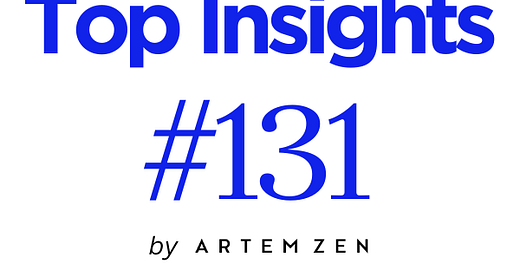👁️ Top Insights #131 - Identity in Spirituality & Politics, Dharma in Disney, and The Hedonist, The Ascetic & The Buddha
Phenomenological and Narrative forms of Identity, Spiritual practice off the cushion, The Middle Way, An Emotions App, Love as the deepest driving force & more.
“Top Insights” is a monthly newsletter that shares mind-expanding podcasts, transformational frameworks, and insightful links that help you go beyond conventional development.
Welcome to the April 2025 edition of Top Insights 🌧️
In a season that holds both rain and bloom, may you welcome the mess, the magic, and the movement toward more aliveness.
Identity in Spirituality and Politics ☯️🇺🇸
The topic of identity is central to many of the threads I’ve been exploring over the years.
There are countless ways to approach identity — from the phenomenological inquiries that emerge through spiritual practice, to the narrative frameworks we encounter in identity politics.
On the phenomenological end, meditation practitioner Ari Nielsen describes identity as an orientation toward a particular pattern of interaction. He also suggests that identity is a form of conceptuality — a mental structure that creates a potential world for us to inhabit.
There are specific patterns in being a father, a husband, a content creator, or a spiritual practitioner — and each identity generates its own kind of world.
When we’re able to move fluidly between identities, they aren’t a problem. The trouble arises when we become fixated on one role or frame of self, and generate suffering through that rigidity.
I’m most drawn to these types of phenomenological explorations of identity because it is only through such inquiries that we can discover the deepest forms of liberation.
With that said, most people don’t examine identity in such a way, and if we want to understand social dynamics, we also need to explore identity through a narrative and societal lens.
One such perspective comes from political scientist Francis Fukuyama, who suggests that identity is rooted in the ancient concept of thymos — the soul’s craving for recognition.
Thymos has two primary expressions:
Isothymia — the desire to be seen as equal in dignity
Megalothymia — the desire to be seen as exceptional or superior
We may not want to admit it, but if we honestly examine the parts of ourselves that strive for greatness, we’ll likely find that the drive isn’t only about service or self-actualization — it’s also about being seen, acknowledged, and even admired.
We can deny or condemn megalothymia, but it’s been with us throughout history — and it’s unlikely to disappear any time soon.
The tension between isothymia and megalothymia is where many of our identity struggles arise.
On one hand, we all want to be treated with equal dignity.
On the other hand, we long to be recognized for our unique gifts, talents, and accomplishments.
In our day-to-day lives, we may try to hold a view of impartiality, but we can’t completely abandon judgment and discernment.
If you need heart surgery, you don’t want just any heart surgeon — you want the best one. And the people who become the best are often fueled, at least in part, by megalothymic motivation.
Fukuyama’s insight is that liberal democracies excel at honoring isothymia — offering legal and civil recognition of equal status — but they struggle to constructively channel megalothymia.
When societies don’t offer healthy outlets for the drive toward excellence, it can morph into status-seeking, domination, or division.
Fukuyama argues that modern identity politics began as a call for equal recognition — a legitimate isothymic cry. But over time, some movements began adopting megalothymic overtones: seeking not just equality, but moral superiority, special status, or the de-legitimization of others.
So the real work — individually and collectively — is learning how to navigate the dynamic tension between isothymia and megalothymia, between sameness and difference, equality and excellence.
This exploration leaves me with some open questions:
How do we deepen the recognition of our shared unity while embracing the fullness of our differences?
How do we strive for greatness while staying grounded in wholeness?
How can we use identity not as a source of division but as a means to increase human flourishing and reduce suffering?
Dharma in Disney ☸️🎢
This past month, I took a family trip to Orlando to visit Disney World and Universal Studios.
While I’m not much of a theme park enthusiast—and I believe my kids have just as much fun playing at home—it still turned out to be a much-needed reset.
We stayed at a beautiful resort and followed a one-day-park, one-day-resort rhythm, which gave us a nice balance of adventure and relaxation.
Since acquiring a walking disability, travel has become particularly challenging — and it was only thanks to an electric scooter that this trip was possible.
It also helped to have a solid squad with us: my mom, my brother, my cousin, and my good friend Russ.
Over three years in, and I’m still learning how to accept and navigate this disability.
As I mentioned in my piece “Finding Wisdom in What is Lost,” when I’m home at my computer, the disability is a non-factor — but the moment I step out of my element and begin moving through the world, I’m confronted with my limitations.
That said, I was in good spirits throughout the trip. Each journey I take gives me a bit more confidence that I can still enjoy traveling — even if I no longer experience the same physical ease and freedom I once did.
Towards the end of our day at Magic Kingdom, we posted up in a particular area to watch the grand finale of the fireworks show.
Sections of the area were marked to indicate where people could stand in order to keep a pathway clear for walking traffic.
We arrived well in advance to secure a good spot, which turned out to be completely unnecessary.
When showtime came, a crowd of people flooded in and surrounded us.
Tired and drained from a long day, I noticed myself getting irritated.
We had waited patiently, and now people were crowding in, disregarding the space we held.
I could feel myself becoming territorial as the tribal parts of me came online.
But in that moment of noticing, something softened.
I realized that in a deeper sense, all these people around me were also my family.
I allowed myself to relax and embrace the crowdedness and with it, this conventional way of enjoying reality.
The fireworks show was a beautifully radiant display of form — arising, blossoming, and dissolving back into emptiness.
Though the trip gave me little time for formal meditation, this was one of many moments where I got to practice off the cushion.
The Hedonist, The Ascetic, and The Buddha 🎂💀🧘♂️
The Hedonist believes that pleasure is the highest good one can seek in this life.
He avoids discomfort at all costs, striving to maximize pleasure in every moment.
On some level, we are all wired to be hedonists—seeking pleasure and instant gratification as a default. In this sense, hedonism can be seen as the most instinctual and primal of philosophical approaches.
Yet, this very quality is also its greatest limitation. Hedonism, while tempting and seemingly satisfying in the short term, is a weak and superficial worldview.
A person who lacks a deeper sense of purpose often settles for the next best thing—pleasure. It is a philosophy rooted in self-indulgence, where immediate gratification outweighs long-term growth or sacrifice. In this way, hedonism can become a selfish, almost animalistic pursuit that avoids the discomfort necessary for true transformation.
On the opposite end of the spectrum lies Asceticism.
The Ascetic voluntarily abstains from worldly pleasure, aiming to achieve a higher state of spiritual realization.
He embraces discomfort and views indulgence as a weakness—a distraction from the pursuit of truth.
Asceticism is inherently more challenging to embody because it runs counter to our natural inclinations.
It demands self-denial, discipline, and the willingness to confront suffering without seeking solace in sensual pleasure.
While it can be seen as more noble than hedonism, asceticism is also misguided.
It risks becoming a rigid and joyless existence, where deprivation drains one’s energy and leaves little to offer the world.
In its purest form, it can lead to isolation, self-judgment, and a loss of connection to the simple joys that make life meaningful.
The transcendence of these two extreme views is what the Buddha called the Middle Way.
This is often understood as a philosophy of moderation, but what the Buddha pointed to was far more radical.
The Middle Way is not just a compromise between indulgence and deprivation; it is a profound realization that both extremes are rooted in attachment—whether to pleasure or to pain.
The Middle Way teaches us to move beyond both hedonism and asceticism by cultivating wisdom, awareness, and intentional living.
It is about honoring the body and the senses without being ruled by them, and embracing discipline without falling into self-punishment.
It calls for a life where pleasure and discomfort are neither sought nor shunned, but seen clearly as transient experiences within a greater flow.
Elevating Consciousness Podcast 🎙
In case you missed it, below is the podcast episode that I released last month.
Education as Medicine, Polarization, Contemplation, and the Meta-Crisis with Brad Kershner - Brad Kershner is an educator, independent scholar, and Head of School at Kimberton Waldorf School. He is also the co-founder of a meta-political think tank – The Reconstitution Project – and is the author of the book “Understanding Educational Complexity: Integrating Practices and Perspectives for 21st Century Leadership”. In addition to his work in education, Brad works in collaboration with thought leaders and spiritual teachers from around the world who are engaged in developing wisdom-based responses to planetary problems. In this wide-ranging conversation, we explore the Waldorf approach to education, child development, the negative impacts of social media, politics and polarization, artificial intelligence, and the role of contemplative practice in wisdom cultivation.
Insightful Links 🔗
John Vervaeke & Jordan Hall on the Jordan Peterson Podcast - Mind expansive triologue with the triple Js. It’s great to see Jordan Hall getting a bigger platform to share his ideas, although some said it was a crime how little space he was given to speak. Even Vervaeke commented on the video, “To my dear friend Jordan Hall, I apologize for talking too much and not making space for you. That was not considerate of me. It was not intentional, but it was negligent. Ideas should not trump relationship.” What do you think?
How We Feel App - If you want to learn how to better navigate your emotions, you need to learn to differentiate them. I recently ran across this app, which allows you to do multiple check-ins throughout the day to track and differentiate your emotional states.
The Sacred Archaeology of Desire- A beautiful exploration of love as our deepest driving force by former monastic Daniel Thorson. I encourage you to subscribe to Daniel’s Substack if your interested in a Dharma that’s equipped for navigating the Meta-crisis.
Resonant Read 📕
I highly recommend this for anyone who wants to understand the role identity plays in politics. I’ve already mentioned some of the ideas from this book earlier in this newsletter but you can also check out this book summary in case you want more.
Quintessential Quote ✍️
"Identity is an ever-evolving question, not a permanent answer." - Rebecca Solnit
Thanks for reading. If you enjoyed this read click the “Subscribe now” button below to subscribe. If you're already a subscriber, click the “Share Insighter” button to share with a friend or the “Leave a comment” button to share some thoughts.







